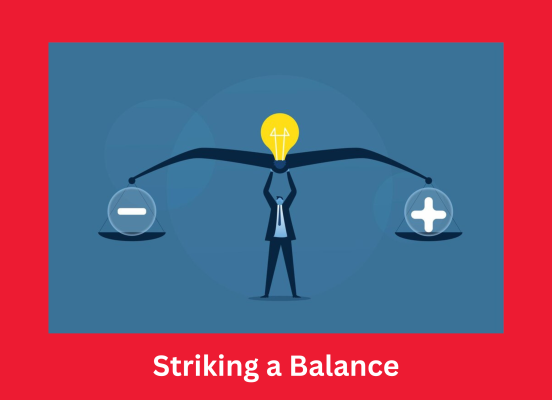
Striking a Balance: Long-term vs. Short-term Goals
- By admin --
- Sunday, 17 Mar, 2024
Introduction:
People might also regularly find out themselves tossing on the spot priorities and on the spot changes in their occupations and individuals. Immediate desired objectives set a certain direction along with city benchmarks, but some future objectives are involved with essential achievements over a long length as well as helping one imagine destiny. Planning and executing those kinds of dreams efficiently requires an information of their distinctions and the potential to strike a stability among them. The cause of this essay is to take a look at the diffused variations between lengthy-time period and quick-term goals, in addition to their respective trends, importance, and techniques for reaching stability.
Differentiating Long-term and Short-term Goals:
Time Horizon:
- It is common for long-term goals to take longer time periods such as months, weeks as well as more than several years until they are achieved as they demand full concentration. This is so in cases involving huge money investments like starting up businesses while others include pension plans and continuous institutional/individual studies. Nevertheless, we find that instant desires normally occur within shorter periods which range from days to three months only.
- These are searching for recognition on particular duties, sports, or aspirations that support the principle intention. Completing assignments, realizing monetary goals, and attending workshops are some times.
Scope and Complexity:
- Goals that take a long time to achieve are typically broader in scope with many stages or phases. They need a lot of planning, allocating resources and turning situations around. In contrast, short-term objectives appear narrower in focus concentrating instead on one or few related activities whose accomplishment might take only some minutes.
- They are often more honest and plausible, making an allowance for quicker remarks and changes.
Flexibility vs. Rigidity:
- Long-time period targets require a few wiggle room to account for unanticipated obstacles, transferring priorities, or changing conditions. To maintain their long-time period desires in keeping with their standard imaginative and prescient, human beings want to study and regulate them on a normal basis.
- Short-time period goals give a clean framework for action and accountability, in addition to a sense of urgency and shape. Short-term objectives are extra exactly defined and allow for greater correct planning and execution, even though flexibility remains important.
Significance of Balancing Long-time period and Short-term Goals:
Alignment and Cohesion:
- Aligning modern-day efforts with standard pursuits is ensured with the aid of striking a stability between long-time period and brief-term desires.
- Short-term prospects are important in an individual's life since these act as a bridge towards achieving ones greater objectives. Otherwise, individuals might be lost in uncharted paths or rather get overwhelmed by the immensity of what one is supposed to fulfill with time, which leads to disengagement.
Motivation and Momentum:
- Setting short term goals opens up areas that one can achieve in a general sense which raises their motivation level hence perpetuating further development. Achieving instant goals leads to satisfaction which acts as a driving force behind the need to fulfill long term goals.
- Although it can be discouraging for travelers to be unable to view any recognizable road signs because all they see are long-distance destinations with no clear signs of whether they have arrived at these points or not even halfway there yet but rather far away from them hence making passage difficult and endless this discourages efforts."
Adaptability and Resilience:
- Maintaining a stability among short- and lengthy-time period goals fosters resilience and edition in the face of complication or failures. With short-time period objectives, people may alter, refine, and change route as necessary, lowering risks and optimizing possibilities.
- Through the renovation of a dynamic balance between short-term movements and lengthy-time period vision, humans might also extra hopefully and agilely navigate via troubles and address uncertainty.
Strategies for Balancing Long-time period and Short-time period Goals:
Prioritization and Sequencing:
- Decide which lengthy-time period objectives are most crucial, then divide them into more potential quick-term targets. Sort brief-term goals into priority lists in keeping with how they relate to lengthy-time period dreams and the way they might affect universal development.
- Set a series of workable short-term targets that give a boost to one another and lead logically to lengthy-time period successes.
Time Management and Allocation:
- Assign sufficient time and assets to each aim to make certain that each lengthy-time period and quick-term aims receive ok interest and attempt. Set up certain time intervals for numerous varieties of obligations the use of productiveness equipment or time-blockading techniques.
- Achieve a balance among urgent activities and lengthy-time period desires to keep away from the mistake of undervaluing both urgency or significance. Strike a balance between constant work on lengthy-time period desires and brief spurts of focused paintings on quick-term goals.
Review and Adjustment:
- Make sure you evaluate your progress towards your short and long-term goals every day so that you can appreciate how far you've come and also remember some of the things that were hard or some principles that you learned in life’s course. Assess the effectiveness of methods used through loops of responses for necessary adjustments.
- Keep an open thoughts in relation to adjusting lengthy-time period dreams in mild of transferring conditions or changing goals. Short-term goals ought to be adjusted as vital to be in line with converting priorities or new possibilities.
Conclusion:
Finding a delicate balance between short-term interest and long-term goals is necessary for one to be able to achieve expertise and personal wholeness. Goals that are set over a longer span of time provide guidance and desire to achieve them, whereas short-term ones bring about urgency and energy. Understanding how these two categories of targets differ from each other and why it is necessary to combine them allows individuals to move on their paths effectively, enduringly, and with clarity.





